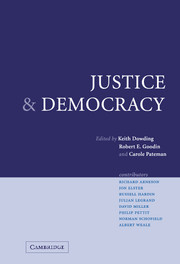Book contents
- Frontmatter
- Contents
- List of figures
- List of contributors
- 1 Introduction: between justice and democracy
- 2 Are democratic and just institutions the same?
- 3 Democracy is not intrinsically just
- 4 ‘The probability of a fit choice’: American political history and voting theory
- 5 Contractarian theory, deliberative democracy and general agreement
- 6 Democracy, justice and impartiality
- 7 Mimicking impartiality
- 8 Justice, democracy and public goods
- 9 The common good
- 10 Individual choice and social exclusion
- 11 Subnational groups and globalization
- References
- Brian Barry's publications
- Index
6 - Democracy, justice and impartiality
Published online by Cambridge University Press: 22 September 2009
- Frontmatter
- Contents
- List of figures
- List of contributors
- 1 Introduction: between justice and democracy
- 2 Are democratic and just institutions the same?
- 3 Democracy is not intrinsically just
- 4 ‘The probability of a fit choice’: American political history and voting theory
- 5 Contractarian theory, deliberative democracy and general agreement
- 6 Democracy, justice and impartiality
- 7 Mimicking impartiality
- 8 Justice, democracy and public goods
- 9 The common good
- 10 Individual choice and social exclusion
- 11 Subnational groups and globalization
- References
- Brian Barry's publications
- Index
Summary
Political agitators from Babeuf or even the Gracchi forward have championed democratization of political structures as a means toward democratization of economic holdings. It usually works, to some extent. When it stops working, someone is usually accused of ‘betraying the revolution’; and there is rarely any shortage of credible candidates.
But betrayal is not the only reason that scrupulously democratic procedures fail to promote perfect substantive justice. Here I shall explore conceptual sources of the slippage, and discuss some devices by which democracy might be better aligned with justice.
The impartiality connection
Analytically, there is a clear link between the concepts of ‘democracy’ and ‘justice’. The link runs through ‘impartiality’, which they both manifest and promote. The same ‘circumstances of impartiality’ are common across both the domain of substantive justice and of procedural democratic fairness: as Brian Barry (1995: 110) says, in passing from the one to the other, ‘what defined fairness there will likewise define fairness here’.
Democracy and justice are not interchangeable
The appeal of those other two concepts cannot be exhaustively analysed in terms of impartiality, however. If so, justice and democracy would be interchangeable, perfect substitutes for one another. Clearly they are not.
Suppose one politician complains that another's proposals are unjust. Were justice and democracy interchangeable manifestations of impartiality, it would be open to the other to reply: ‘No need for us to argue about justice; let's just call a vote and see what wins’.
- Type
- Chapter
- Information
- Justice and DemocracyEssays for Brian Barry, pp. 97 - 111Publisher: Cambridge University PressPrint publication year: 2004
- 13
- Cited by



